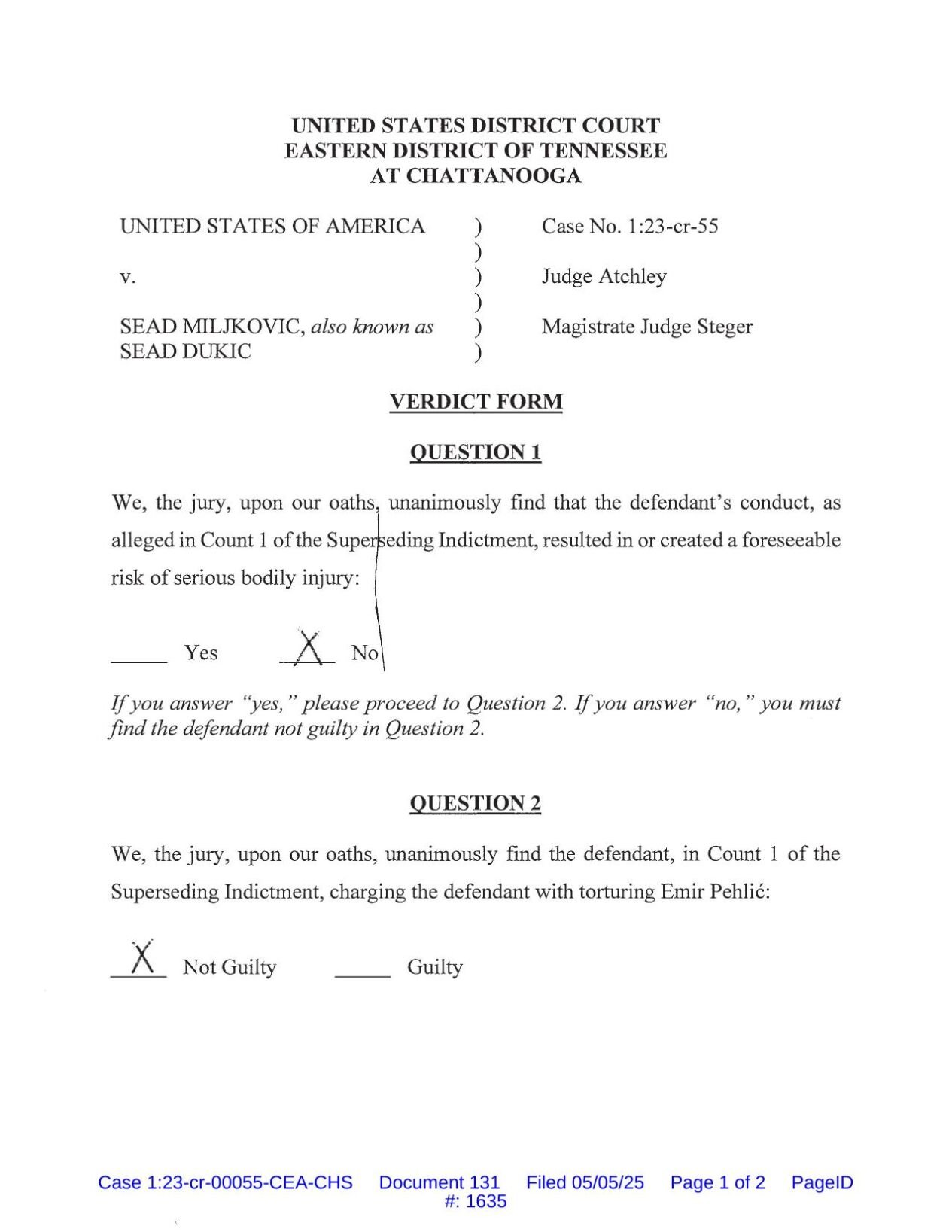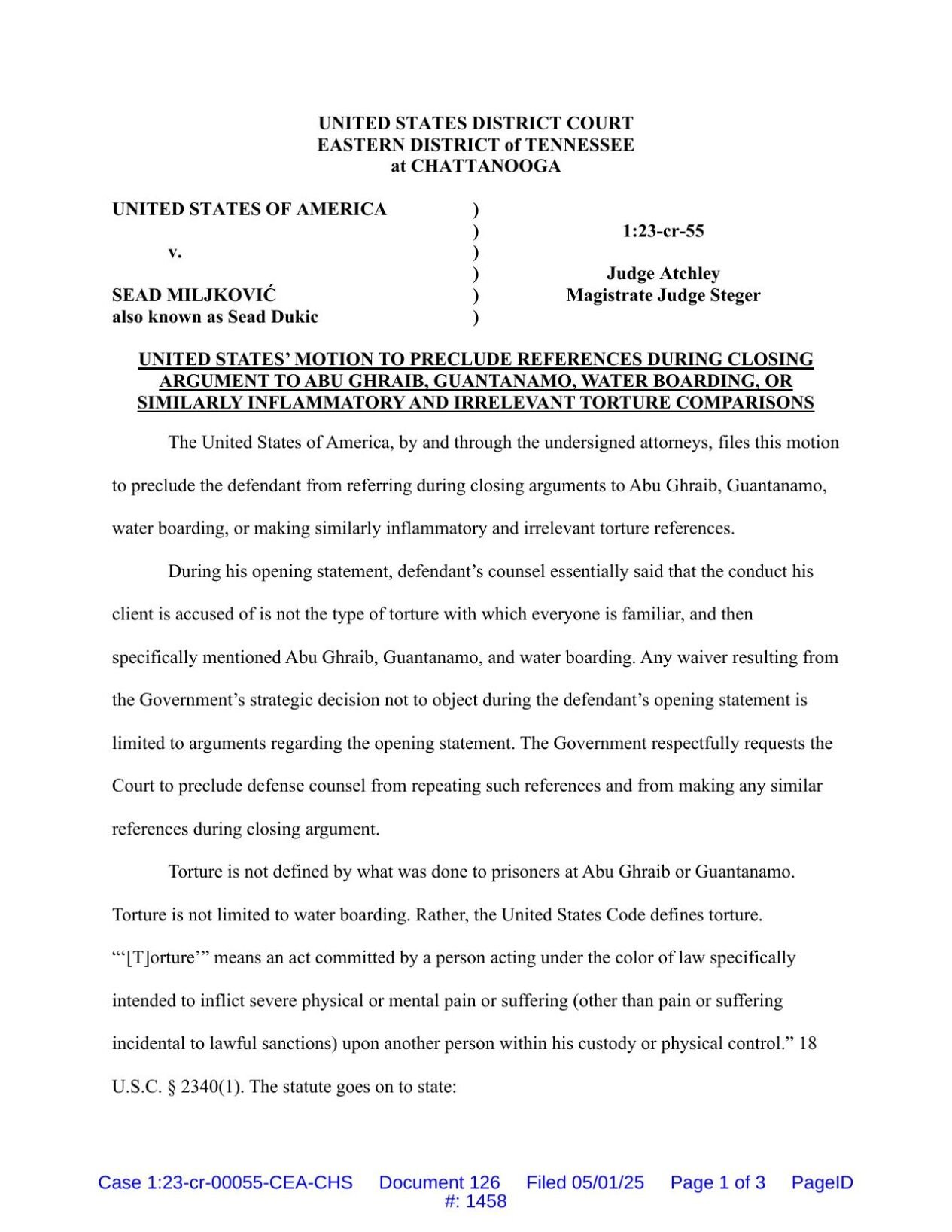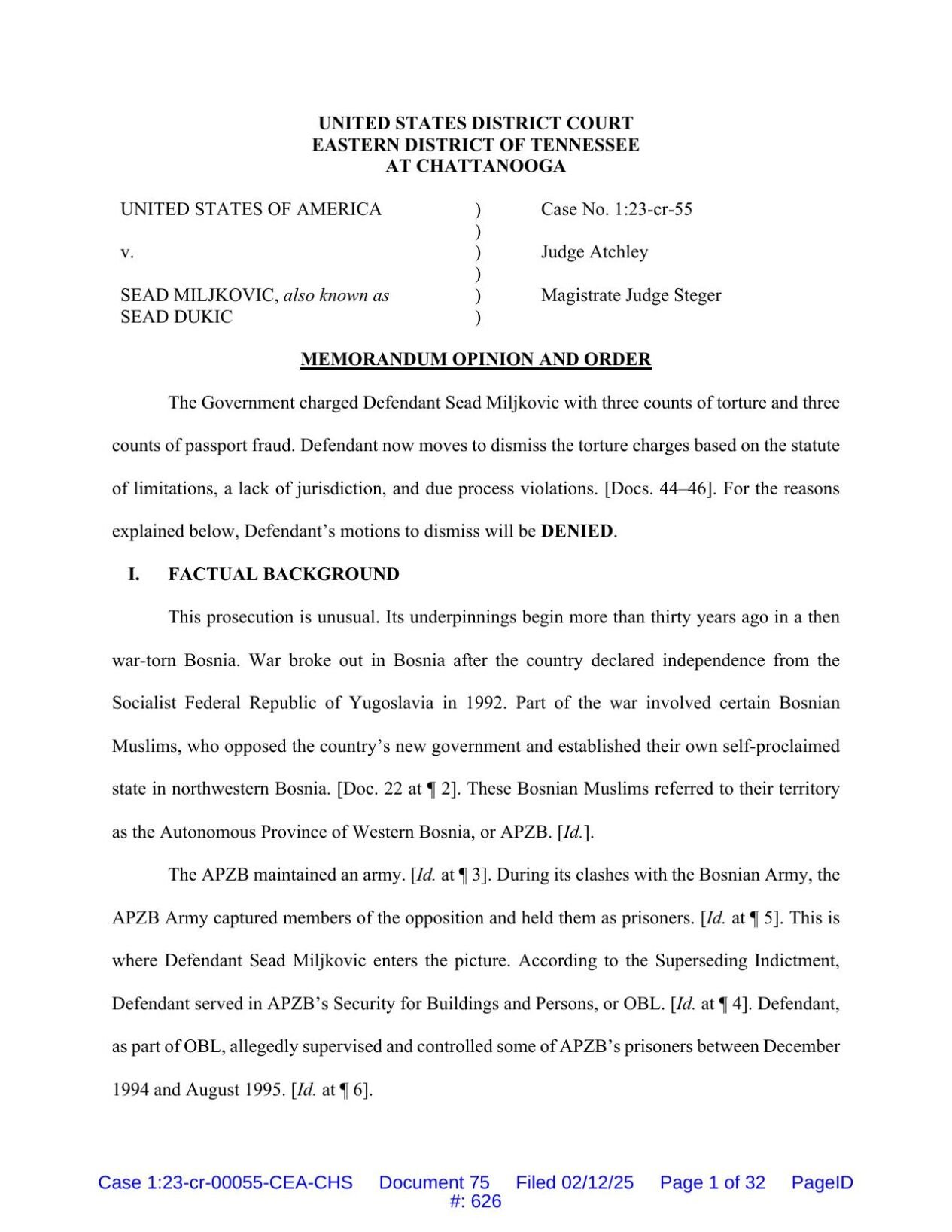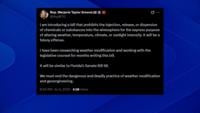UPDATE: A Bosnian man who was cleared of torture charges will be back in federal court for a plea deal over a pending charge of passport fraud.
Court records filed on June 17 show that 53-year-old Sead Miljković has agreed to plead guilty to one count of passport fraud after he was found not guilty of torture charges on May 2, 2025.
Federal prosecutors agreed to drop two of the three counts of passport fraud in exchange for his plea.
Miljković was facing a second trial before the agreement was reached.
The defendant could face deportation from the United States. He also faces a maximum sentence of 10 years in prison and fines.
A hearing for the plea agreement has been scheduled for July 15, 2025 at 2:00pm.
Stay with Local 3 News for updates to this story.
PREVIOUS STORY: A Bosnian man who was cleared of torture charges in federal court last week by a Chattanooga jury is scheduled to have a second trial in July.
Court records show a date has been set for the start of 53-year-old Sead Miljković's second trial over a charge of passport fraud.
Miljković was accused of torturing two men who were prisoners of war during the conflict in Bosnia in the early 1990s.
A jury found him not guilty of those charges on May 2, 2025 after deliberating for less than two hours.
Stay with Local 3 News for updates to this story as they become available.
PREVIOUS STORY: A Bosnian man who was accused of torturing prisoners during the 1990s conflict in Bosnia has been found not guilty of those federal charges by a jury in Chattanooga on Friday.
Sead Miljković, 51, was found not guilty of federal torture charges by the jury after less than two hours of deliberations.
Miljković was accused of torturing at least two men who were prisoners of war during the conflict in Bosnia in the early 1990s.
During closing arguments on Friday afternoon, the government ended its case by saying that Sead Miljkovic’s lies are the reason the trial was taking place. The prosecution stressed the importance of using common sense and told the jury to reject anything that does not link to the evidence and facts of the case.
The prosecution reminded the jury of the first witness’s claim that the defendant pushed his head on a blade and that hitting a person with a pipe, as Miljkovic’s was accused of doing, is enough to meet the legal definition of torture.
The prosecution also told the jury that “torture” is about intent and reminded the jury of witness two’s claims about Miljkovic allegedly tossing a truck tire to him from atop a hill as he was working at a camp ini Stari Grad, Croatia.
The prosecution told the jury that the defendant tortured prisoners by forcing them to fight each other, before recounting the testimony by a former guard at Stari Grad who claimed he told Miljkovic to stop the fighting.
The defense focused on the differences in the sworn statements given by the first two witnesses over the years as to what happened to them during their time as prisoners of war.
The defense questioned why the first witness went from claiming in 2023 that Miljkovic only stood by and watched the incident involving the blade to claiming that the defendant pushed his head on the blade in 2025.
The defense told the jury that witness one lied by omission because he failed to say anything about the incident with the blade in at least two sworn statements given in 2015 and 2017.
It is noted that the first witness claimed to not be seeking any kind of monetary payout from the defendant before the defense reminds the jury that the witness asked for money on two previous occasions.
The defense then addresses the second witness, telling the jury that he has credibility problems.
The defense cited sworn statements from previous years in which the second witness’s accounts of the weather conditions and the months he spent in the prison vary.
The defense cites a former guard at Stari Grad, a witness called by the prosecution to give testimony about what he saw during his time stationed at the camp when the prisoners were there.
The former guard said that no road was built during his time at the prison camp as witness one and two had claimed in their testimonies about the alleged torture they experienced, the defense cited.
The jury was reminded by the defense that the second witness never mentioned an incident involving a truck tire when he spoke to Bosnian authorities in 1996, just nine months after his release from the prison camp when his side won the war.
The defense brought up the differences in witness two’s account from 2023 when he said he was beaten for 15 days to his account in 2025 of being beaten everyday while at the camp.
The defense pointed out how the second witness said he was given too much food in his 1996 statement to authorities and then testified during the trial that he was barely fed.
The judge then read instructions to the jury before all nine men and three women began deliberating.
Miljković was found not guilty on both torture charges after the jury deliberated for just under two hours.
Court records show Miljković still faces a charge of passport fraud, in which a separate trial will be held on a date to be determined.
Stay with Local 3 News for updates to this story as they become available.
PREVIOUS STORY: Closing arguments are expected to begin in the trial of a Bosnian man who is charged with torturing prisoners during the 1990s conflict in Bosnia following his arrest in Hamilton County.
The trial of 51-year-old Sead Miljković, who is charged with torture and passport fraud.
On Thursday, the prosecution wrapped up its case in federal court and was told by the judge they could formally rest the case on Friday before taking up instructions for jury deliberations.
The defense said it would not be calling any witnesses, indicating that Miljković would not testify in his trial.
Friday morning, the judge reviewed instructions for the jury with both the prosecution and defense with each side primarily objecting to some of the language in the instructions and how it was phrased.
During the review, it was revealed that the prosecution filed a motion late Thursday night to stop the defense from making comparisons of the torture the prisoners claimed they faced to previous cases involving forms of torture, like waterboarding, during closing arguments.
The prosecution also wanted to keep the defense from using the photo arrays in closing arguments that was admitted as evidence by the prosecution during the trial.
A prosecutor argued that it should not be used by the defense on the principle of fairness since US investigators were not allowed to use the photos during interviews with the alleged victims in Bosnia. The defense countered that the photos were already admitted as evidence in the trial and were fair game.
The judge ultimately decided to consider amending some of the language in the instructions on items, like the definition of serious bodily injury, and the jury was allowed to break for lunch.
The judge also sternly warned each side to stick to the facts presented during the trial while making closing arguments or else they would be reprimanded in front of the jury.
Miljković is accused of torturing three men who were captured during the Bosnian conflict and held as prisoners of war at multiple encampments including one in Stari Grad, Croatia, where the abuse in question is said to have happened.
Stay with Local 3 News for updates on the trial as they become available.
PREVIOUS STORY: The federal trial of a Bosnian man who was living in Chattanooga when he was charged with torturing prisoners during the 1990s conflict in Bosnia resumed on Thursday morning.
The trial of 51-year-old Sead Miljković, who is charged with three counts of torture and three counts of passport fraud.
Miljković is accused of torturing three men who were captured during the Bosnian conflict and held as prisoners of war at multiple encampments including one in Stari Grad, Croatia, where the abuse in question is said to have happened.
His trial resumed on Thursday morning with brief testimony from a third witness who testified to telling U.S. investigators in 2023 that he never saw Miljković give orders to other guards at the encampment, following testimony on Wednesday by former war prisoners that claimed otherwise.
A fourth witness took the stand and said he was captured on December 9, 1994 and ended approximately 30 days at Stari Grad before he was freed on August 7, 1995.
The witness said he met Miljković for the first time when arrived at the camp and was beaten on several occasions by either the defendant or by guards following the defendant's orders.
The witness claimed he was injured on one occasion when he said Miljković threw a truck tire at him from the top of a hill and told him to catch the tire.
The witness said the tire was large enough to reach his waist and that he was unable to catch it due to its size. The witness said he braced for the tire to hit him on the side and claims he was knocked about 5 meters back by the tire on impact.
The witness said he was approached by an unnamed superior of Miljković who gave him cigarettes after checking on him and told to stop working when the witness said his shoulder was hurt. The witness goes on to say he was given a handful of pills by a doctor and other prisoners helped him put his shoulder back in the socket, despite no medical diagnosis of a dislocation.
The witness also said he was made to fight other prisoners and was always made to fight men who were larger than him, including one man who the witness claimed that guards feared approaching unless they were armed.
The defense brought to light a 5-page statement the witness gave to Bosnian authorities on May 16, 1996 where he described other guards at the camp in Stari Grad but no description was given of Miljković.
The defense points out the only other statement given by the witness in the 27 years since the first in 1996 came in 2023 when he was visited again by Bosnian authorities.
The defense noted the witness's use of a nickname given to Miljković in the 2023 report before the prosecution objected and court broke for lunch following a brief huddle with the judge.
Court resumed on Thursday at 1:40pm with the defense finishing its cross examination of witness four by asking him why his statement from 1996 did not mention anything about the incident involving the tire or other injuries he stated in the 2023 report.
The defense asked witness four, "Are you saying you have a better memory of what happened 28 years later than you did nine months after you were released?"
Witness four replied that more and more memories of what happened came back to him in the years since.
In response to a follow-up by the prosecution, the witness claimed that he received most of the beatings during his time as a prisoner at Stari Grad where Miljković was stationed.
A fifth witness took the stand who said he knew Miljković from serving on the front lines with him during the Bosnian conflict and from also serving as a guard at Stari Grad.
Witness five said he never witnessed Miljković hit the alleged victims or any of the prisoners during his time at the camp.
The witness also said that the guards at the camp did not allow prisoners to fight one another, to the best of his knowledge.
Witness six was also a guard at Stari Grad who was there in January of 1995 before taking sick leave that February and returning June or July of that same year.
Witness six said that he and Miljković had the same rank but said the defendant was the promoted while the witness was on sick leave.
Witness six said he never saw the behavior Miljković is accused of but said he told the defendant that he should stop if it was true, to keep himself out of danger.
Witness six said Miljković replied by saying he had spies throughout the camp and that witness six could end up as a prisoner himself.
Witness six said that he never saw prisoners performing any of the work they testified to doing against their will on orders from Miljković.
The day ended with testimony from a special agent with the Department of Homeland Security who explained the kinds of investigations conducted by the agency and how they worked.
The agent was shown photos of evidence taken from Miljković's home during a search.
At least three photos of Stari Grad were found during the search and taken as evidence.
The prosecution is expected to formally rest its case on Friday when court resumes at 9:00am and then closing arguments are expected to follow.
We will have a crew in the courtroom.
Stay with Local 3 News for updates on the trial as they become available.
PREVIOUS STORY: The federal trial of a Bosnian man who was living in Chattanooga and is accused of torturing prisoners during the 1990s conflict in Bosnia began Wednesday at the Joel W. Solomon Federal Building and U.S. Courthouse.
Sead Miljković, 51, faces charges of torture and passport fraud.
On Wednesday, the prosecution called its first witness to the stand who is named as “victim one” in court documents.
The witness testified to being held as a prisoner in three different encampments from March to August 1995.
The witness says Miljković appeared to serve as a commanding officer at the third and final encampment, located in Stari Grad, Croatia, where the witness was held.
The witness testified to knowing Miljković from their childhood days, recounting stories of the two playing soccer and other memories.
The witness also recalled being beaten by the guards on multiple occasions while he was in the encampments.
Victim one said in one incident, he was given orders not to talk while he was working to clear brush from a field. He said he was approached by an armed guard who began speaking to him as he was working.
Victim one said Miljković saw him talking to the guard and walked over to them. The witness said Miljković took the guard's rifle and hit him four to five times on the hands and arms as he was trying to guard his face.
Victim one said he was hit three to four on his back as he successfully tried to keep from falling to the ground so the assault would not get worse.
Victim one said he also recalled another incident involving Miljković and two other guards at the encampment, who forced him to bend over a chair.
The witness said Miljković also forced his head onto a bayonet blade that was part of an M70 rifle as he was leaning over the chair.
The witness said he that could not see Miljković as he was on the chair but said he knew it was Miljković who held pushed his head on the blade because he could see the other two guards that helped Miljković take him to the place where the alleged incident happened.
The witness said that he pleaded with Miljković to stop the assault and said that all he could think about was never seeing his child again as it continued.
The trial broke for lunch shortly after 12:30pm Wednesday and resumed around 1:50pm with the defense’s cross-examination of the witness identified as victim one.
The defense used reports that were filed in 2012, 2015, 2017, and 2023 by victim one with Bosnian authorities, citing there was no mention of the incident involving the bayonet blade until 2023 when victim one claimed that he saw Miljković as he stood by and watched the incident happen.
The defense then cited that victim one never mentioned Miljković pushing his head on the bayonet blade until 2025.
Victim one said he didn't say anything about Miljković pushing his head on the blade because he did not remember it until after he filed the 2023 report with Bosnian prosecutors while he was under oath.
Victim one also said that he never mentioned the assault in the 2015 report that was filed because the questions were about other events that happened while he was held captive.
The prosecution asked victim one if he was simply seeking money and he ended his testimony by replying that he was not looking for a payout.
The prosecution then called a second witness who said he was captured at the same time and place as victim one.
The second witness recalled the incident that allegedly involved Miljković hitting victim one with another guard's rifle for talking while working to clear a field.
The second witness said he was about two meters away when he saw Miljković hit victim one with the rifle three times on the back, causing him to fall to the ground on his knees.
The second witness also said he saw Miljković and two other guards take victim one to a small home at the Stari Grad location where the alleged incident with the bayonet happened.
The second witness said he did not see what happened inside the home but said he could hear victim one screaming from the outside as he was working meters away.
Court dismissed for the day following the testimony by the second witness.
The trial will resume at 9:00am on Thursday. A third witness and former war prisoner is expected to take the stand for the prosecution along with an official from the Department of Homeland Security.
Stay with Local 3 News for continuing coverage of this story.
PREVIOUS STORY: A federal trial begins on April 30 with a Hamilton County Grand Jury for a Bosnian man living in Chattanooga who allegedly tortured prisoners in the 1990s.
Sead Miljkovic, 51, faces charges of torture and passport fraud.
The suspected crimes occurred 30 years ago.
Local 3 News is in the courtroom to bring you the latest.
PREVIOUS STORY: A Bosnian man living in Chattanooga who allegedly tortured prisoners in the 1990s will not have his charges dismissed after a federal judge denied his motion.
Sead Miljkovic, also known as Sead Dukic, had been charged with three counts of torture and three counts of passport fraud, according to a ruling from United States District Judge Charles Atchley Jr.
Dukic and his attorneys moved to dismiss the charges primarily because they say the statute of limitations has run out. They also claimed the government lacked jurisdiction and had violated due process.
Although his suspected crimes occurred near 30 years ago, the federal judge concluded the defense's arguments were null.
"None of Defendant’s arguments regarding the statute of limitations, due process, and vagueness warrant pretrial dismissal of the Superseding Indictment’s torture counts. Accordingly, Defendant’s motions to dismiss [Docs. 44–46] are DENIED."
Read federal judge Atchley Jr.'s full ruling here:
Below you'll find background on the case, including case context from the superseding indictment.
PREVIOUS STORY: The Eastern District of Tennessee's United States attorney office announced that a Chattanooga man was arraigned on Thursday for torturing prisoners during the armed conflict in Bosnia and Herzegovina in the 1990s.
According to a recent superseding indictment, 51-year-old Sead Miljković, aka "Sead Dukic," was allegedly a member of the Obezbjeđenje objekata i lica (OBL), a police force of the Autonomous Province of Western Bosnia (APZB).
“Sead Miljković allegedly tortured prisoners and then decades later lied about his identity to obtain a U.S. passport,” said Acting Assistant Attorney General Nicole M. Argentieri of the Justice Department’s Criminal Division. “Neither the passage of time nor a defendant’s concealment efforts will prevent us from bringing human rights violators to justice and ensuring that perpetrators of torture cannot seek refuge in the United States.”
“The superseding indictment’s torture charges are serious human rights abuses that cannot go unpunished,” said U.S. Attorney Francis M. Hamilton III for the Eastern District of Tennessee. "We thank our investigative partners on this case for their outstanding efforts to gather evidence required for these charges.”
Miljković and other OBL members allegedly inflicted brutal beatings on the prisoners, using a metal pipe, rifle butt and shovel handle, investigators say. They also threatened the prisoners with death.
“Homeland Security Investigations (HSI) is resolute in its commitment to protecting human rights and the pursuit of justice,” said Special Agent in Charge Rana Saoud of HSI Nashville. “The United States in not a safe haven for war criminals and human rights violators. Thanks to the dedication of our HSI Chattanooga special agents, Miljković will now have to answer these allegations in court.”
Miljković is charged with three counts of inflicting torture on prisoners. In June, he was charged in a three-count indictment for passport fraud.
Investigators say Miljković could face a maximum penalty of 20 years in prison for each count if convicted.
This is a developing story that will be updated when more information is available.












